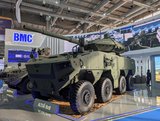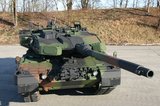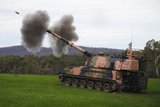NATO partners send Patriot GEM-T missiles to Germany
The NSPA enables multi-national defence procurement, increasing buying power on bulk order items like the GEM-T Patriot missile. (Photo: Raytheon)
Germany will have its stockpile of Patriot GEM-T missiles replenished through funds raised by its NATO allies. The move, which will give Raytheon, the company that makes the missiles, a US$478 million payday, will be co-ordinated by the NATO Support and Procurement Agency (NSPA).
The Agency allows for multi-national defence procurement funding across NATO partners. In this case, Denmark, the Netherlands and Norway have agreed to foot the bill to re-arm Germany, after Germany’s donation of Patriot missiles to Ukraine in its fight against the Russian invasion of the country.
By funding the Raytheon missile procurement, Denmark, Norway and the Netherlands are showing their military support of Ukraine through a convenient procurement arrangement within NATO. President Putin of Russia is on record as blaming NATO encroachment for moves like the Ukraine invasion, and the NSPA funding is a way of sending military aid to Ukraine without depleting overall NATO defence resources.
The GEM-T, the Patriot Advanced Capability 2 missile interceptor, is a key part of the air defence of 19 countries, including eight in Europe. It acts as an interceptor for use against tactical ballistic missiles.
Tom Laliberty, president of land and air defence systems at Raytheon, said that countries like Denmark, the Netherlands and Norway, were “realising the benefits of bundled, multi-national procurement of Patriot missiles through NSPA, including the economies that offer greater affordability and the pre-negotiated contracting framework that shortens the acquisition timeline”.
Laliberty added: “As a result, not only can we better support the missile inventories for these European partners, we can also strengthen our cooperation, their interoperability and their contribution to an essential NATO mission.”
What makes the NSPA work in collaborations like the German missile restocking is the economies of scale achievable by mass multi-national orders, which would be beyond the reach of individual NATO partners at any given time.
Stacy A. Cummings, general manager at the NSPA, said the Raytheon missile procurement was an example of “multinational acquisition, support and sustainment, delivering effective and cost-efficient multinational solutions to nations, while reinforcing European industrial capacities”.
Related Programmes in Defence Insight
More from Land Warfare
-
![US Army plans Q2 prototype proposal request for its Mobile Tactical Cannon programme]()
US Army plans Q2 prototype proposal request for its Mobile Tactical Cannon programme
The US Army is seeking a mature 155mm, wheeled, self-propelled capability to replace the towed M777 howitzer in the Stryker, Mobile and Infantry Brigade Combat Teams as it targets a potential 498-unit acquisition goal.
-
![British Army’s Project Stokes 120mm mortar bids due in March 2026]()
British Army’s Project Stokes 120mm mortar bids due in March 2026
Project Stokes could see a new 120mm mortar capability enter British service, with domestic production and international partnerships central to competing bids.
-
![MKJ Warrior Series — The Nett Warrior Qualified Connector for Today’s Soldier Systems]()
MKJ Warrior Series — The Nett Warrior Qualified Connector for Today’s Soldier Systems
ITT Cannon’s MKJ Warrior connectors are designed for the harshest environments, delivering mission critical comms, navigation and USB data/power.
-
![Active vehicle protection comes to the forefront as Trophy and Iron Fist secure contracts]()
Active vehicle protection comes to the forefront as Trophy and Iron Fist secure contracts
Experience on the battlefield is accelerating the adoption of active protection systems as technologies continue to evolve to reflect shifting global defence needs.
-
![World Defense Show 2026: Hanwha increases Middle East presence and reveals Tigon 6x6 sale]()
World Defense Show 2026: Hanwha increases Middle East presence and reveals Tigon 6x6 sale
Shephard sat down with Hanwha Middle East and Africa president Sung Il at World Defense Show 2026 to hear about the company’s plans for the region and how it plans to use local industry success to win deals.

























